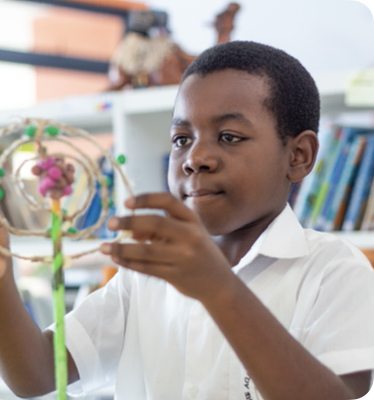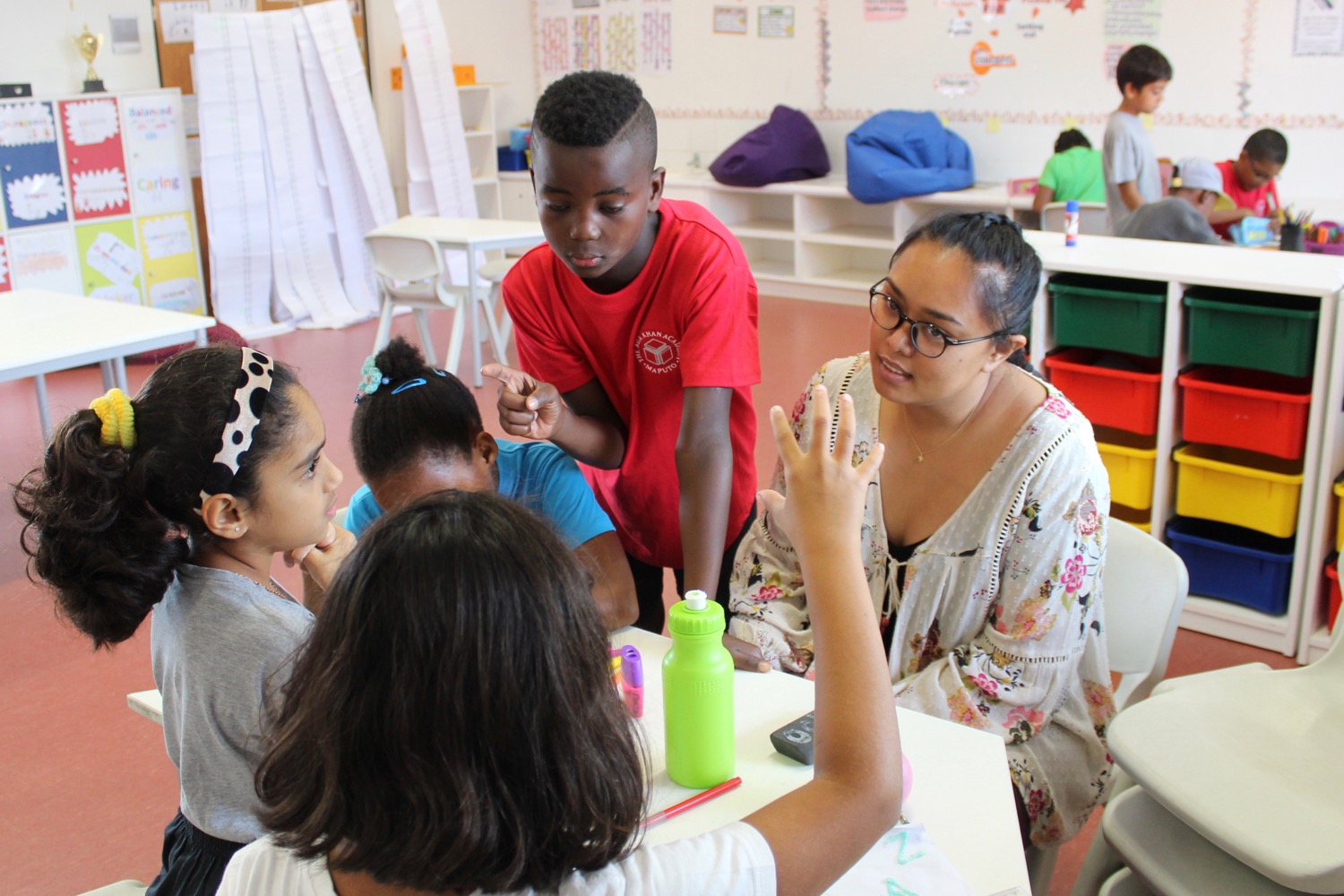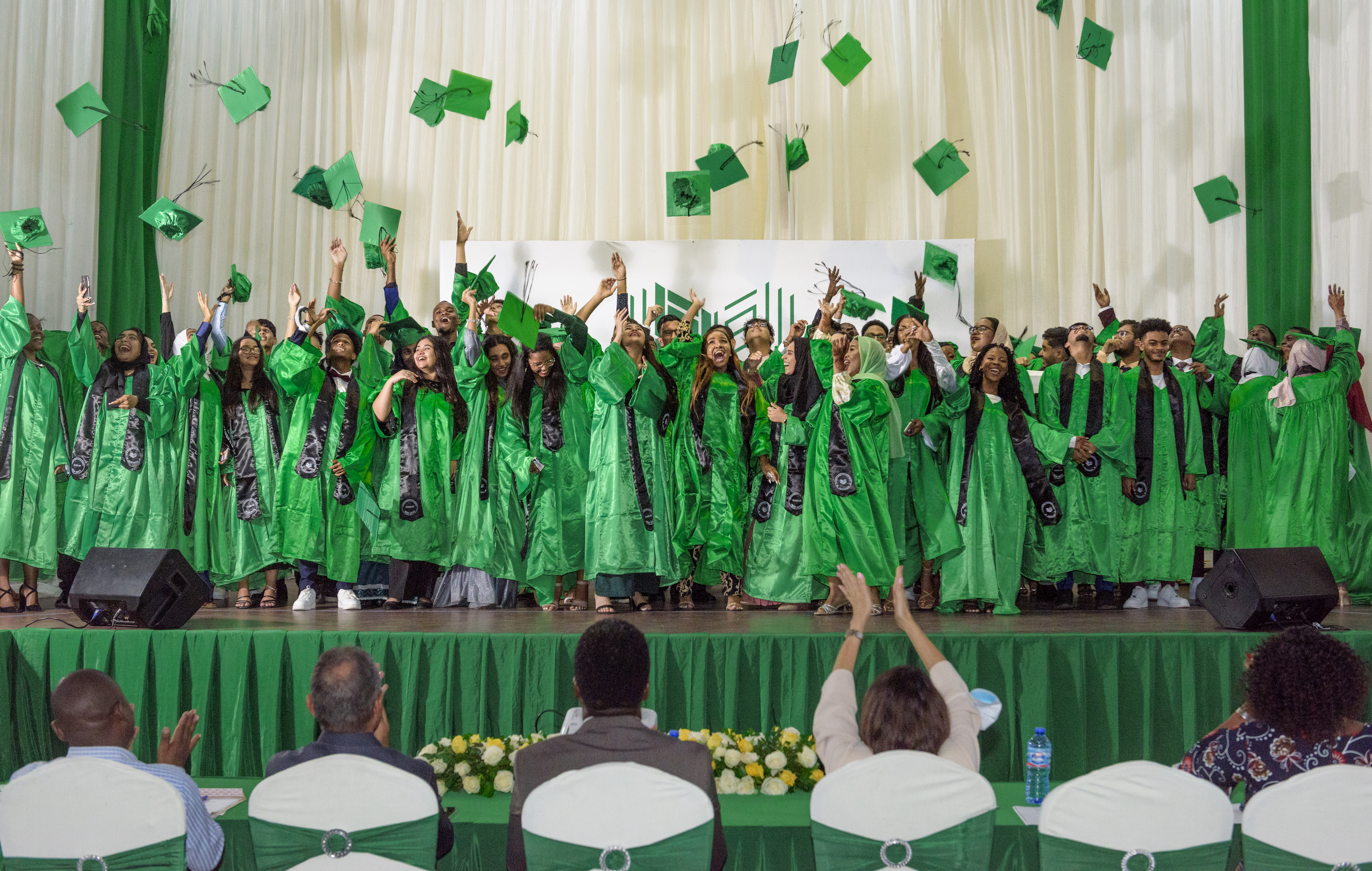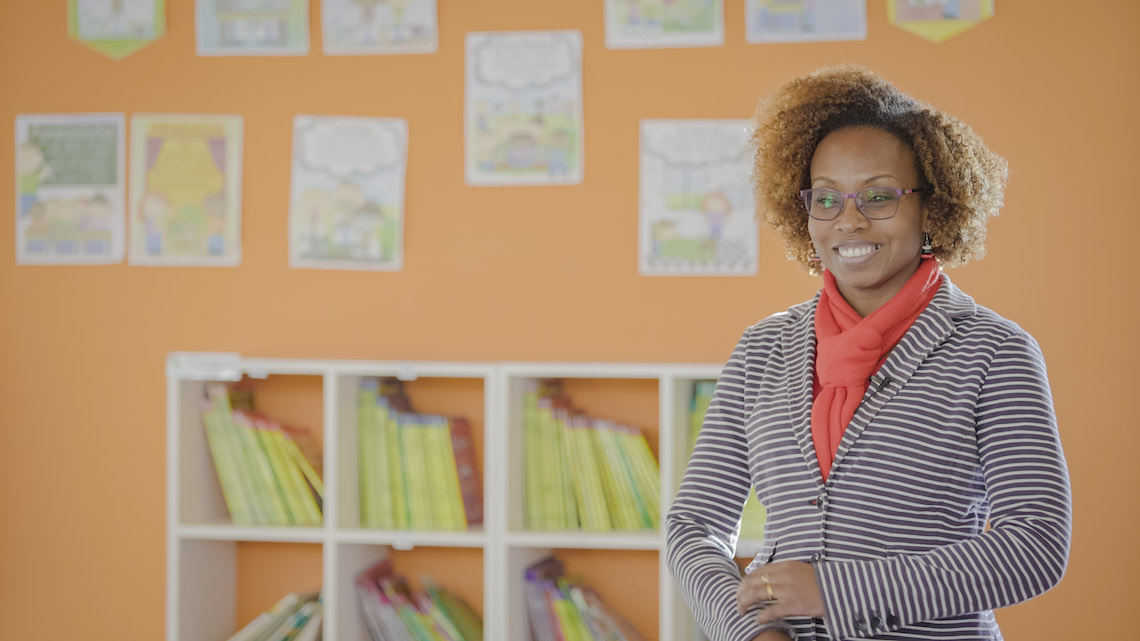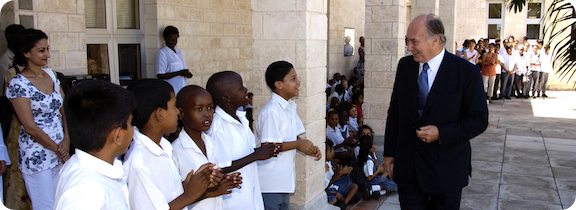
Vision
The outlook and educational perspectives of the Aga Khan Academies are based on the vision of His Highness the Aga Khan. His vision looks to education of the highest quality that can prepare young people to lead and enact positive change in the world they inhabit.
The text below outlines His Highness' vision for the Aga Khan Academies.
A time of change
"We live in a time of rapid change — change that is often unpredictable and not always positive. My experience with development, as an observer and a practitioner, has led me to the conclusion that the best way to manage change, whether positive or negative, is to prepare for it and that there is no greater form of preparation for change than investments in education. These investments must focus, of course, on teachers of the highest quality — teachers who are creative and committed to their own life-long learning and self-improvement. It also means investments in facilities that provide an environment conducive to the less tangible but equally important elements of an education — self-esteem, leadership, tolerance, ethical judgment and moral reasoning."
What does it mean to be educated?
“However, as educators and parents have begun to make these investments, they are revisiting the age-old question: What does it mean to be an educated person? Many have come to realise that education must prepare students not only for the job market, but also for life.
From Zanzibar's madrassas to Britain's public schools, from American university preparatory academies to government schools in Pakistan, there is a realisation that education must equip students with more than a narrowly focused curriculum based on reading, writing and mathematics. It must expose students to a broad and meaningful study of the humanities, including science, music and art. The teaching of history and world civilisations must be more broadly representative of the world's entire heritage than it has in the past. This is especially true in regard to Islamic civilisations, which have been misrepresented or ignored despite their vital contributions in a wide range of spheres, from science to architecture.
Education must include mastery of more than one language and an ability to communicate effectively in those languages. In the face of the most rapid advances in technology in history, education also must teach students how to master information technologies. These skills now form a critical part of the learning process, as well as essential qualifications for application in the workplace, but even these elements are not enough."
Preparing children for life
“An education must equip students with the tools that enable them to adapt and thrive, in a world characterised by change. In such an environment, technical proficiency is not enough. Education that prepares children for life must go beyond fundamental skills to stimulate creativity, intellectual curiosity and honest inquiry. Advancement and development, both personal and societal, are dependant on these elements. Innovation and progress arise from the ability to approach a challenge in a new way and offer a solution."
A pluralistic outlook
“Education must also make the case for a pluralistic tradition in which other views, ethnicities, religions and perspectives are valued not only because that is just and good, but also because pluralism is the climate best suited for creativity, curiosity and inquiry to thrive. It must also stimulate students to consider a variety of perspectives on some of the fundamental questions posed by the human condition: 'What is truth?' 'What is reality?' and 'What are my duties to my fellow man, to my country and to God?' At the same time, education must reinforce the foundations of identity in such a way as to reinvigorate and strengthen them so that they can withstand the shock of change."
The most important measure of an education
“What students know is therefore no longer the most important measure of an education. The true test is the ability of students and graduates to engage with what they do not know and to work out a solution. They must also be able to reach conclusions that constitute the basis for informed judgements. The ability to make judgements that are grounded in solid information and employ careful analysis, should be one of the most important goals for any educational endeavour. As students develop this capability, they can begin to grapple with the most important and difficult step: to learn to place such judgements in an ethical framework.
“For all these reasons, there is no better investment that individuals, parents and the nation can make than an investment in education of the highest possible quality. Such investments are reflected and endure, in the formation of the kind of social conscience that our world so desperately needs."
His Highness the Aga Khan
Access the biography of His Highness the Aga Khan on the Aga Khan Development Network website.
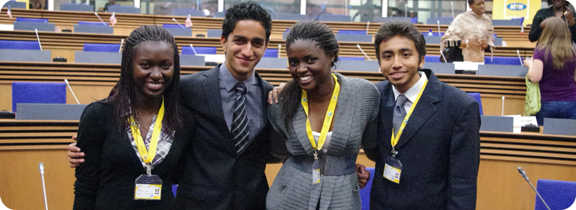
Student Leadership
The Academies’ programmes aim to develop students who are ethical, public-minded and who possess a pluralistic outlook. Both curricular and co-curricular activities work to educate effective home-grown leaders who are actively engaged in their local communities and are aware of the implications of their actions. Through their participation in co-curricular clubs, students are encouraged to take on leadership positions in a variety of different forms (e.g. house leaders, student council, team captains, dorm duties).
Not only do these opportunities provide an environment to explore and enhance skills such as cooperation and problem solving, they also enable students to set personal goals and challenge themselves.
Student leadership activities vary from community service opportunities to sports and expressive arts. Students have opportunities to participate in the Student Representative Council and other similar activities.
Leadership activities instil in participants a sense of community ownership, creativity and a collaborative spirit, and prepares them for a lifetime of active engagement and leadership.
"The conviction that home-grown intellectual leadership of exceptional calibre is the best driver of a society’s destiny, underpins the Ismaili Imamat’s endeavour to create catalytic centres of educational excellence."
Idah Khan O'Neill: Playing a Vital Role in Teacher Effectiveness and Enhancement
Always an innovator, Idah and a colleague at the school incorporated playful learning in the school’s rigorous International Baccalaureate (IB) curriculum in their Primary 2 classrooms. According to the school’s newsletter, this pioneering method created “a rich environment where playful learning flourished in the school’s IB Curriculum.”
Reflecting back on a play unit in her classroom on family finances, Idah said what made it such a successful unit was that the children were not only learning curricular concepts and skills but were also deeply engaged in the process and were motivated to learn more. She added, “I think inquiry is most powerful when it is current and instant. So, when kids have an idea and you are feeling that idea, you cannot quite wait for next week for it to happen. You have got to give it your all for it to really take hold.”
Idah’s involvement as an educator started in Singapore where she was a Montessori school teacher for a number of years before moving to Jakarta, Indonesia where she opened a Montessori school. Having run the school for four years, Idah decided to move back to Singapore to work at the German European School as a Kindergarten teacher. Here she was assigned the role of PYP Coordinator for Kindergarten and was part of a guided management and teaching team.
Armed with a Bachelor’s degree in Early Childhood Studies from the University of Monash in Australia and an advanced diploma in Montessori Education, Idah is currently pursuing a Master’s Degree in Education at the online University of the People.
Highly self-motivated, Idah is fluent in English, Malay and Bahasa Indonesia. Additionally, she has good conversational proficiency in Mandarin and Danish. Now that she is in Mozambique, Idah says she is looking forward to learning Portuguese.
She relishes the IB programme and cherishes its effectiveness. She is a member of the International Baccalaureate Educator Network, a PYP School Visiting Team Member, PYP Curriculum Connections Service Provider, a PYP Curriculum Reviewer, and a PYP Workshop Leader.
Her volunteer work reflects her compassion and her caring for others. She was a volunteer teacher in Sumatra, Indonesia, and the United Kingdom. She also travelled to rural India looking at water conservation projects under the Aga Khan Foundation and developed a Unit of Inquiry On Water Use in the Aga Khan Academies and also in local schools.
Idah feels that with her new appointment at the Academy, she is getting closer to attaining her “reason for being” or her Ikigai. Ikigai, she explains, is a Japanese concept that is usually used to indicate the purpose in one's life or the things that make one's life worthwhile. She states that she would very much like to be part of His Highness the Aga Khan’s vision of the Academies, who on June 2004 said in Mozambique, “above all, it is my hope that these schools will stimulate creativity, intellectual curiosity and honest inquiry so that their students can adapt and thrive in a world of rapid change; can make informed judgments on life’s daily challenges, and place those judgments in an ethical framework.”
She feels she is very fortunate to be given this opportunity. “It is my mission, in my capacity as a Teacher Coach, to be able to help realize this goal through play and creativity with regards to the way we teach and learn.”
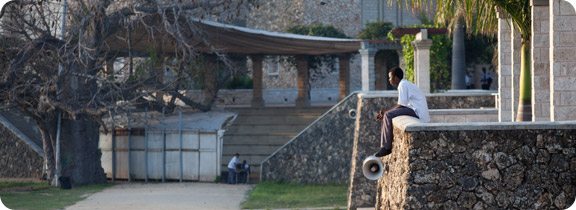
The Aga Khan Development Network
The Aga Khan Development Network (AKDN) is a group of non-denominational agencies that work to improve living conditions and opportunities for the poor across countries of the developing world. Building on an underlying ethic of compassion for the vulnerable in society, the agencies in the Network focus on health, education, culture, rural development, institution building and the promotion of economic development.
Education is a central focus of the AKDN. The Network has been involved in education in the developing world for over a century. Its education programmes cover a wide spectrum of activities, from pre-primary to post-secondary education, teacher training, literacy programmes, school improvement and educational policy reform. The AKDN aims to increase access to quality education for all, particularly those that historically have been underserved or excluded.
The Aga Khan Academies form one arm of the Network's education endeavours. The Academies' focus on developing future leaders is complemented by the work of several other AKDN agencies. Together they provide programming that addresses a range of educational needs across the societies in which they operate. In addition to the Academies, the AKDN's lead organisations in education include the Aga Khan University, the University of Central Asia, the Aga Khan Education Services and the Aga Khan Foundation.
Within the AKDN framework, the Aga Khan Academies exist to both educate exceptional students and disseminate new teaching techniques and learning approaches. Investing heavily in the professional development of teachers is critical to the Academies’ mission of providing students with a rigorous academic and leadership experience.
Learn more about the Aga Khan Development Network, and its work in education and other focus areas, on the AKDN website.
Adilia Cabral: Standing Up for Inclusiveness and Respect in Classrooms
Throughout the course of her teaching journey, Adilia Cabral has valued the importance of inclusivity in creating an engaging and fruitful environment in the classroom. She shares details of her evolution during her time at Aga Khan Academy Maputo.
For the Aga Khan Academy Maputo teacher, Adilia Denise Aly Guedes Evaristo Cabral, mutual trust between teachers and students, as well as between students themselves, is of paramount importance for a thriving classroom. It is a crucial factor for any successful learning experience. And how does Adilia ensure this flourishing environment persists in her classroom in Maputo, Mozambique? By supporting students and ensuring they support and respect each other.
“I teach with love because I want to gain the trust and friendship of students. I am always available to listen to them and I want them to feel comfortable sharing their problems with me. I always try to look students in the eye and read their body language, because that's what dictates how I should react with a particular student that day,” she says, adding, “I also make sure there is a spirit of cooperation between students in the classroom.”
Listening to Adilia and the details of her background, education and experience, one feels she chose the perfect career for herself.
“When I was a young student in school, one of my aunts, who was an educator herself, told me that I should follow the teaching profession because she saw I had a passion for that calling. I am glad I listened to her. I love to teach and want to inspire and empower my students to excel in whatever they choose to do.”
Adilia was born in Mozambique in the province of Beira. She has a degree in French teaching from the Pedagogical University in Maputo, Mozambique. After graduating in 2004, she taught in private schools around the cities of Maputo and Matola. She joined the Academy in 2017 where she teaches French Language Acquisition and Portuguese Language and Literature.
The Academy’s International Baccalaureate (IB) curriculum is interwoven with the rich Aga Khan Curricular Strands of ethics, pluralism, economics for development, cultures, governance and civil society. These play a vital role in Adilia’s instruction as she incorporates them in her lessons.
“One way to ensure that in a pluralistic environment there is no discrimination or bullying is to make students respect each other regardless of colour, race or background. This is an aspect that is always reinforced within the Academy through the Aga Khan Academies' Learner Profile, in the classrooms and the way our units are designed.”
Making certain students respect each other and work together is important to Adilia. But so is independent learning. As she explains, “During my class, I prioritise teamwork, group work and peer work as well. All students must respect each other regardless of disagreements. As for training small leaders, the activities are designed so that each student takes action in the units. I always give students opportunities to become independent and look for solutions to overcome problems and obstacles. In my classes, each student contributes to the success of the group.”
Joining the Academy has been a transformative journey for Adilia. It has helped her in her personal and professional growth and has made it possible for her to become a more effective educator.
“The Academy has made me a better instructor by giving me feedback on my teaching,” she states and adds, “also, the institution offers ongoing training courses to make teachers more effective and more successful.”
Reflecting on her time at the institution, Adilia says a day that was especially rewarding and memorable for her was the day she graduated from the Academy’s Teachers Preparation Programme (TPP).
“I felt special,” she recounts with pride. “I felt recognised for what I was doing and it made me aware of how important the training was and how important the teaching profession was. The Academy was placing great trust in me. And I had to work hard for not only for myself, but for my students and for my country. That day was the beginning and not the end of a long journey.”
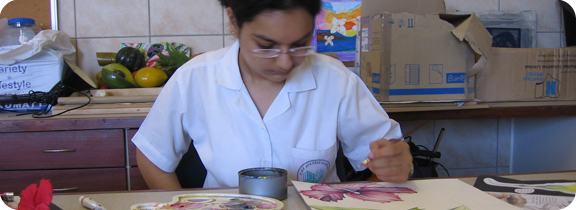
International Baccalaureate
The academic programme at the Aga Khan Academies was developed following the principles of the International Baccalaureate (IB), a world-class educational programme that emphasises rigorous, consistent schooling aligned to international standards. As a result, the Academies' Learner Profile exemplifies students and faculty that are open-minded, principled, reflective and inquiring individuals.
The International Baccalaureate programme provides international standards of evaluation, allowing students to pursue post-secondary education at world-class institutions of their choosing, with the skills for independent, creative thought and inquiry. It has become the curriculum of choice at international schools throughout the world.
The IB has come to be known not only for academic excellence but also for promoting pluralism – an understanding and appreciation of other cultures, languages and points of view.
The IB originated in Switzerland when teachers at the International School of Geneva, working with schools in Asia, Europe and the Americas, created the IB Diploma. The programme is administered by the International Baccalaureate, a non-profit institution based in Geneva, Switzerland.
Through its Primary Years (nursery school to year 5), Middle Years (years 6–10), and Diploma (years 11–12) Programmes, the focus is on creating a globally relevant education, with the integration of local contexts. Additionally, students at each Aga Khan Academy are instructed in both English and the national language, so they are able to work within their communities as well as around the world.
For more information on the International Baccalaureate, please visit the IB website.
Sumeya Taquidir: Becoming a dynamic teacher
Sumeya Nemane Ussene Taquidir believes learning is a continuous process and that the Aga Khan Strands help her, as a teacher, to be dynamic and creative.
Sumeya is a year 6 and 7 Middle Years Programme science teacher, who joined the Aga Khan Academies through the Teacher Preparation Programme, which develops new teachers into International Baccalaureate practitioners. She spent a full academic year at the Aga Khan Academy Mombasa as part of her training through the programme before joining the Aga Khan Academy Maputo.
Born in Maputo, Mozambique, Sumeya graduated with a Bachelor’s of Education in science (Physics and Minor Electronic) from the Pedagogical University, Mozambique. She joined the Academies because of their philosophy of education, which engages students actively in the process of learning, and the environment of continuous professional development that helps teachers develop effective teaching methods.
During her time in Mombasa, Sumeya had the opportunity to learn how to improve her teaching skills. When asked what helped her become a more effective teacher, she said it was, “the opportunity to go to the Academy in Mombasa for training, [where] we received support in various areas in order to improve our methodologies of teaching. [The Academy provided] us the opportunity to participate in workshops, online trainings and use online resources.”
Sumeya feels that the most rewarding aspect of teaching is when she sees students applying the Aga Khan (AK) Strands in different ways. The Aga Khan Strands are cross-curricular areas of learning that help students develop dispositions and knowledge required by future leaders. Sumeya recalls, “My special memory from the Academy in Mombasa was my first day of teaching. I was very nervous mainly because I was being observed. The lesson was good, the students were familiar with the learner profile and the AK Strands, therefore, it was easy to deliver the lesson.”
She believes that with the teacher’s incorporation of the AK Strands and the learner profile into lessons, the students are better able to understand why they should respect other cultures and work together.
Although Sumeya knows that teaching is not an easy job at times, she believes that accepting challenges, communicating with students and their parents, and reflecting on teaching helps achieve positive results.
“I think it is important to create an environment with mutual respect, honesty, good relationships, and communication should be a highest priority…My rule as a teacher is to guide the students to build [their] knowledge and provide a safe environment for learning with collaborative work, respect and sharing ideas among them.”
The Academies are designed as residential schools, with many of the Senior School students living on campus. During her time in Mombasa, Sumeya had the opportunity to interact with students in the Academy’s residences, and believes that residential life complements academics and produces leaders. “They can have a different experience living with others of different cultures. They can build the spirit of leadership and they learn to think for themselves."
Teaching is ultimately a two-way process for Sumeya. She explains that she too learns from the unique environment of the Academies and through interaction with students of diverse backgrounds. “I am conscious that learning is a continuous process; every day we learn something new [which] makes me more curious to learn new things. That is why we have to be creative and dynamic teachers.”
By Inaara Gangji
Teacher Preparation Programme graduation - Tuesday 12th March 2019
Five Academy teachers will be graduating from the TPP at an evening ceremony attended by Academy leadership, network representatives, friends & family.
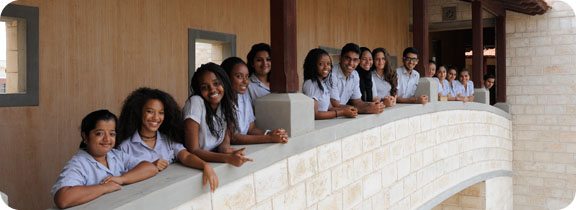
Bridging Global and Local
The Aga Khan Academies provide a globally relevant education, notably through the Aga Khan Curricular Strands (AK Strands), co-curricular offerings and student life. Students are exposed to global themes that emerge from the local context within which students live and learn.
The curriculum is based on the International Baccalaureate (IB) programme, and the overall Academies educational programme is aimed at developing students with strong leadership potential.
The AK Strands focus on globally applicable concepts such as pluralism and global economics. Students are also instructed in English and a local language in all Academies.
Academy students will be expected to spend time on another Academy campus during their secondary school years, thus providing them an immersion experience in a different culture.
The shared IB curriculum enables student and teacher exchanges between Academies.
"A great school, will educate its students not merely to be personally successful but also to use their gifts to build their communities and enhance the common good to levels beyond our dreams."
